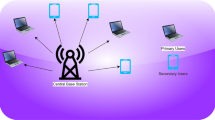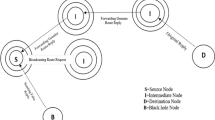Abstract
In the context of Intermittently Connected Mobile Networks, researchers have proposed different collaborative routing schemes with fundamental objectives to maximize packets delivery, and minimise latency through improving peers’ routing decisions. One promising approach adopted by researchers to improve peers’ routing decisions is a trust-based routing mechanism. Most current trust-based protocols in the literature enable peers to make routing decisions based on trust relationships that manifest among peers but with less concern about the peers’ attributes. This further made the design of efficient, collaborative routing protocols a challenging task due to the high dynamics of peers’ characteristics and mobility. In this paper, we hypothesise that in a trust-based routing protocol, it will be additional trust evaluation reliability if peers can take into consideration their partners attributes’ status in addition to the trust relationships. We propose DATM protocol; a trust-based scheme to enforce collaborative behaviour in wireless mobile networks taking into consideration the peers’ attributes for an efficient routing scheme. We introduce a personalised similarity algorithm for peers’ attributes modelling as a scaling factor for trust evaluation. The relative comparison of the DATM and PROPHET protocol using simulation shows the improved performance of our proposed model in terms of messages delivery, messages overhead and average latency.






Similar content being viewed by others
References
Abdalla, M. O., Nagarajan, T., & Hashim, F. M. (2013). Analysis of innovative design of energy efficient hydraulic actuators. Analysis, 3(1), 001–007.
Ahmed, A., Abu Bakar, K., Channa, M. I., Haseeb, K., Khan, A. W., & Khan, A. W. (2015). Terp: A trust and energy aware routing protocol for wireless sensor network. IEEE Sensors Journal, 15(12), 6962–6972.
Anantvalee, T., & Wu, J. (2007). Reputation-based system for encouraging the cooperation of nodes in mobile ad hoc networks. In 2007 IEEE international conference on communications (pp. 3383–3388). IEEE.
Bello, A., Liu, W., Bai, Q., & Narayanan, A. (2015a). Exploring the role of structural similarity in securing smart metering infrastructure. In 2015 IEEE international conference on data science and data intensive systems (pp. 343–349). IEEE.
Bello, A., Liu, W., Bai, Q., & Narayanan, A.(2015b). Revealing the role of topological transitivity in efficient trust and reputation system in smart metering network. In 2015 IEEE international conference on data science and data intensive systems (pp. 337–342). IEEE.
Canca, D., De-Los-Santos, A., Laporte, G., & Mesa, J. A. (2016). A general rapid network design, line planning and fleet investment integrated model. Annals of Operations Research, 246(1–2), 127–144.
Chen, I.-R., Bao, F., Chang, M. J., & Cho, J.-H. (2014). Dynamic trust management for delay tolerant networks and its application to secure routing. IEEE Transactions on Parallel and Distributed Systems, 25(5), 1200–1210.
Crosby, G. V., Hester, L., & Pissinou, N. (2011). Location-aware, trust-based detection and isolation of compromised nodes in wireless sensor networks. IJ Network Security, 12(2), 107–117.
Dai, H., Jia, Z., & Qin, Z. (2009). Trust evaluation and dynamic routing decision based on fuzzy theory for manets. Journal of Software, 4(10), 1091–1101.
Duan, J., Gao, D., Yang, D., Foh, C. H., & Chen, H.-H. (2014). An energy-aware trust derivation scheme with game theoretic approach in wireless sensor networks for IoT applications. IEEE Internet of Things Journal, 1(1), 58–69.
Esposito, C., Castiglione, A., Palmieri, F., & Ficco, M. (2015). Trust management for distributed heterogeneous systems by using linguistic term sets and hierarchies, aggregation operators and mechanism design. Future Generation Computer Systems, 74, 325–336.
Ho, J.-W., Wright, M., & Das, S. K. (2012). Zonetrust: Fast zone-based node compromise detection and revocation in wireless sensor networks using sequential hypothesis testing. IEEE Transactions on Dependable and Secure Computing, 9(4), 494–511.
Jiang, D., Ying, X., Han, Y., & Lv, Z. (2016). Collaborative multi-hop routing in cognitive wireless networks. Wireless Personal Communications, 86(2), 901–923.
Kamvar, S. D., Schlosser, M. T., & Garcia-Molina, H. (2003). The eigentrust algorithm for reputation management in p2p networks. In Proceedings of the 12th international conference on World Wide Web (pp. 640–651). New York: ACM.
Kapoukakis, A., Pappas, C., Androulidakis, G., & Papavassiliou, S. (2013). Design and assessment of a reputation-based trust framework in wireless testbeds utilizing user experience. In Ad-hoc, mobile, and wireless network (pp. 1–12). Berlin: Springer.
Keränen, A., Ott, J., & Kärkkäinen, T. (2009). The ONE simulator for DTN protocol evaluation. In SIMUTools ’09: Proceedings of the 2nd international conference on simulation tools and techniques, New York, NY, USA. New York: ICST.
Krifa, A., Barakat, C., & Spyropoulos, T. (2008). Optimal buffer management policies for delay tolerant networks. In 2008 5th annual IEEE communications society conference on sensor, mesh and ad hoc communications and networks (pp. 260–268). IEEE.
Li, N., & Das, S. K. (2013). A trust-based framework for data forwarding in opportunistic networks. Ad Hoc Networks, 11(4), 1497–1509.
Lindgren, A., Doria, A., & Schelen, O.(2004). Probabilistic routing in intermittently connected networks. In P. Dini, P. Lorenz & J. Neuman de Souza (Eds.), Service assurance with partial and intermittent resources (pp. 239–254). Berlin: Springer.
Liu, H., Zhang, B., Mouftah, H. T., Shen, X., & Ma, J. (2009). Opportunistic routing for wireless ad hoc and sensor networks: Present and future directions. IEEE Communications Magazine, 47(12), 103–109.
Maltz, D. A. (1996). Dynamic source routing in ad hoc wireless networks. Mobile Computing, 353(1), 153–181.
Mari, F., Melatti, I., Tronci, E., & Finzi, A. (2013). A multi-hop advertising discovery and delivering protocol for multi administrative domain manet. Mobile Information Systems, 9(3), 261–280.
Naseer, A. R. (2012). Reputation system based trust-enabled routing for wireless sensor networks. New York: INTECH Open Access Publisher.
Palazzi, C. E., & Bujari, A. (2012). Social-aware delay tolerant networking for mobile-to-mobile file sharing. International Journal of Communication Systems, 25(10), 1281–1299.
Prasad, R. S., Dovrolis, C., & Thottan, M. (2007). Router buffer sizing revisited: the role of the output/input capacity ratio. In Proceedings of the 2007 ACM CoNEXT conference (p. 15). New York: ACM.
Rezgui, A., & Eltoweissy, M. (2007). Tarp: A trust-aware routing protocol for sensor-actuator networks. In IEEE international conference on mobile adhoc and sensor systems, 2007. MASS 2007 (pp. 1–9). IEEE.
Stefanello, F., Buriol, L. S., Hirsch, M. J., Pardalos, P. M., Querido, T., Resende, M. G. C., et al. (2017). On the minimization of traffic congestion in road networks with tolls. Annals of Operations Research, 249(1), 119–139.
Sun, Y., Luo, H., & Das, S. K. (2012). A trust-based framework for fault-tolerant data aggregation in wireless multimedia sensor networks. IEEE Transactions on Dependable and Secure Computing, 9(6), 785–797.
Tan, H. C., Ma, M., Labiod, H., Chong, P. H. J., & Zhang, J. (2016). A non-biased trust model for wireless mesh networks. International Journal of Communication Systems, 30, 1–18.
Tavakolifard, M. (2012). On some challenges for online trust and reputation systems. Doctoral Thesis, Norwegian University of Science and Technology, Trondheim, p. 211.
Usman, A. B., & Gutierrez, J. (2016). A reliability-based trust model for efficient collaborative routing in wireless networks. In Proceedings of the 11th international conference on Queueing theory and network applications, QTNA ’16 (pp. 15:1–15:7), New York, NY, USA. New York: ACM.
Usman, A. B., Liu, W., Bai, Q., & Narayanan, A. (2015). Trust of the same: Rethinking trust and reputation management from a structural homophily perspective. International Journal of Information Security and Privacy (IJISP), 9(2), 13–30.
Vahdat, A., Becker, D. (2000). Epidemic routing for partially-connected ad hoc networks.
Xia, H., Jia, Z., Li, X., Ju, L., & Sha, E. H.-M. (2013). Trust prediction and trust-based source routing in mobile ad hoc networks. Ad Hoc Networks, 11(7), 2096–2114.
Xia, F., Liu, L., Li, J., Ma, J., & Vasilakos, A. V. (2015). Socially aware networking: A survey. IEEE Systems Journal, 9(3), 904–921.
Ye, D., Zhang, M., & Yang, Y. (2015). A multi-agent framework for packet routing in wireless sensor networks. Sensors, 15(5), 10026–10047.
Yu, Y., Li, K., Zhou, W., & Li, P. (2012). Trust mechanisms in wireless sensor networks: Attack analysis and countermeasures. Journal of Network and Computer Applications, 35(3), 867–880.
Author information
Authors and Affiliations
Corresponding author
Rights and permissions
About this article
Cite this article
Usman, A.B., Gutierrez, J. DATM: a dynamic attribute trust model for efficient collaborative routing. Ann Oper Res 277, 293–310 (2019). https://doi.org/10.1007/s10479-018-2864-5
Published:
Issue Date:
DOI: https://doi.org/10.1007/s10479-018-2864-5




